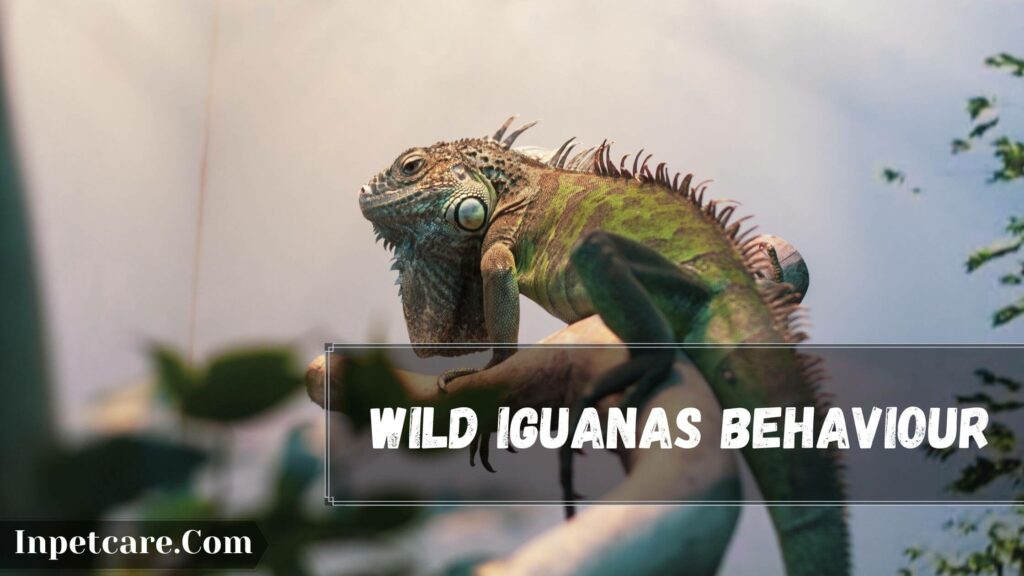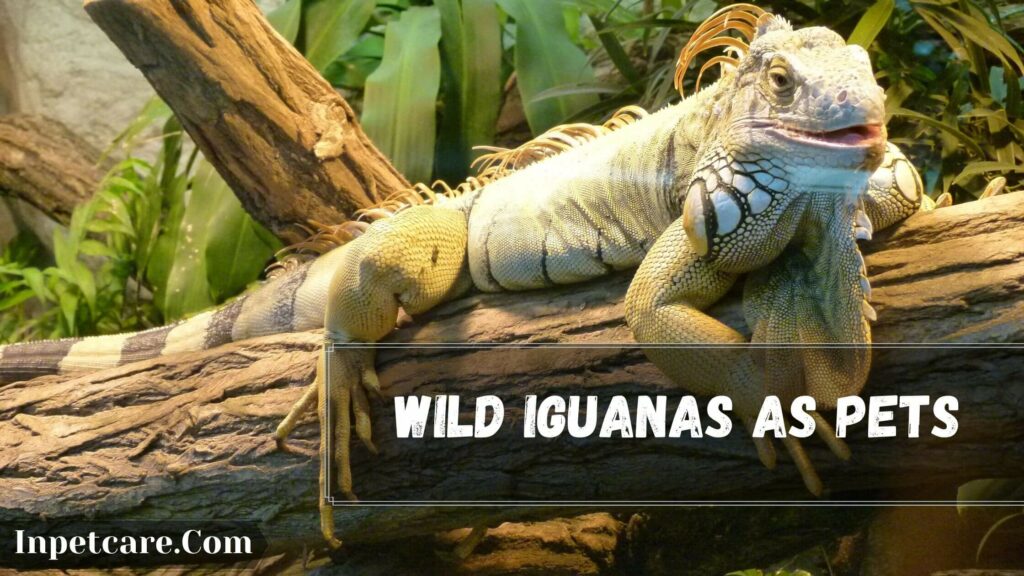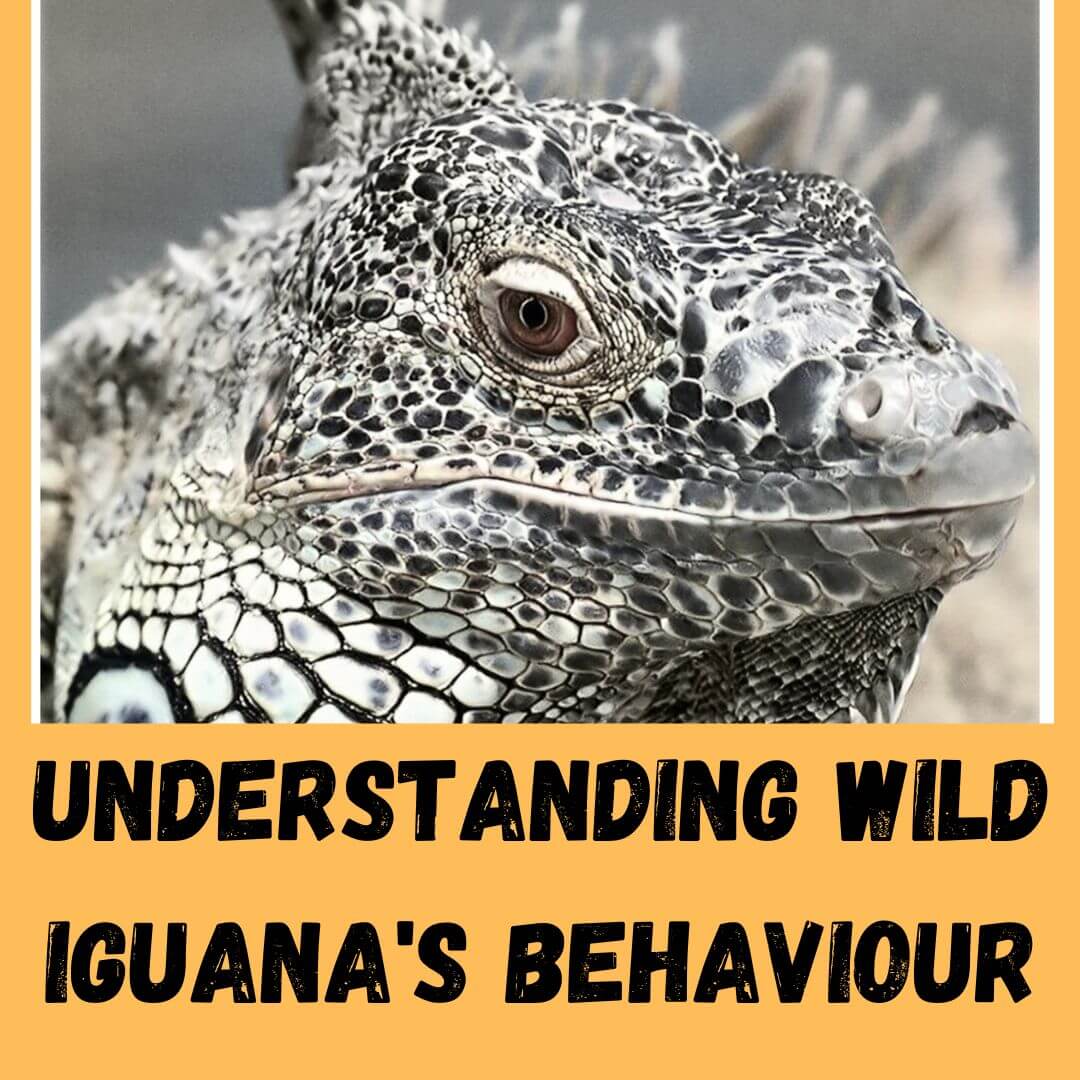Wild Iguanas are invasive in Florida and are usually hunted by predatory Birds. They range over a large geographic area and are native to Brazil, Paraguay and Mexico. Therefore, this article will look at wild iguanas’ behaviour and learn: are wild Iguanas friendly?. We will also look at some general questions that are frequently asked all over the internet on Wild Iguanas Behavior. First, let’s begin with knowing their behaviour and learn if they are friendly.
Wild Iguanas Behavior

The first thing about their behaviour is that they are very docile and can get easily frightened. When the wild iguanas are disturbed by predatory species, they often attempt to flee or dive into the water to swim away if near a water body. If a Predator corners them, it will extend and puff up its body while hissing at the thread.
They also display the dewlap under its neck while stiffening its body to appear bigger. Their fear of being hunted is exploited as a ploy to catch them in the wild. An Iguana also stops its activity and even freezes if they hear screaming or whistling of any predatory species, including the sound of a hawk. Let’s look at some frequently asked questions on wild Iguanas’ behaviour.
Are Wild Iguanas Friendly?
No. Wild iguanas are not generally friendly or affectionate by Nature. But, they are not aggressive as well. Besides that, they can be tamed and bond over time if given time. Many iguanas have been successfully raised into friendly pets who recognise their owner if trained properly and have patience. But, those were bred in captivity. Wild iguanas are not close to humans or other animals like dogs or cats.
Are Wild Iguanas Mean?
Yes. Wild iguanas can sometimes be mean when you feed them. In the wild, if you are feeding wild iguanas, they may not even look back to thank you after gobbling up all foods served to them. However, depending on each personality, some wild iguanas may also come to you for occasional visits to say hi and have some treats.
Are Wild Iguanas Nice?
Wild Iguanas are not always nice as they are known to dig holes near sidewalks, in your garden, and even in your garage. They can also leave faeces that contain salmonella bacteria harmful to pets like dogs or cats and even to humans.
However, they can be nice if they are in their old territory while living their own life. Overall, wild Iguanas can have an unexpected temperament. Therefore, they cannot be said to be completely nice.
Are Wild Iguanas Poisonous?
Yes. Wild Iguanas are poisonous to small animals but not to humans. Wild Iguanas bite is not toxic to humans, but the wound needs to be treated well. Their mouths contain many harmful bacteria and viruses that can infect you and cause unnecessary sickness. Therefore Always treat the wound.
Are Wild Iguanas Dangerous?
No. Wild iguanas are not dangerous to humans, but they carry some harmful bacteria that can affect many animals. Bacteria like salmonella bacteria are very effective in causing health issues like itching in the skin or illness in humans.
You should never touch their poop or body to avoid these bacteria. It is never recommended to handle a wild Iguana unless it is very much necessary. If you were to take it, make sure to wear a glove.
Do Wild Iguanas Attack Humans?
No, wild Iguanas don’t attack humans as they tend to be very vulnerable to creatures bigger than themselves. They may even not attack any animal larger than its body size.
They always look to hide or flee away as soon as they see big animals. Wild Iguanas are usually frightened by humans. Thus, unable to make any attacking move. However, they may bite you if you pick them up.
Do Wild Iguanas Bite?
Yes. While Iguanas can bite people. Hence, they are not known for attacking or biting people. They only bite in self-defence. Their sharp teeth can tear plants apart but not the skin of humans. However, that bite is capable of causing too much pain to humans.
Fortunately, wild Iguanas are known to give a warning before biting so. You will notice an aggressive Iguana standing on its leg while leaning forward to signify they feel threatened. On the other hand, wild Iguanas also Bob their heads as a warning sign.
Do Wild Iguanas Carry Diseases?
Yes. Wild Iguanas do carry diseases in their intestinal tract. Like other reptiles, wild Iguanas also take salmonella bacterias to shed periodically in their faeces. If that bacteria gets on your skin, it is capable of causing infections.
Do you know that most infections in children are generally caused by the salmonella found in turtles? Plus, Iguana is also a source of such condition, which has been discovered recently. Salmonella is nothing else than just a zoonotic disease transmitted from animals to humans.
Can You Tame A Wild Iguana?
No. wild Iguanas can be very tough to tame in captivity if captured from the wild. The Iguana living in the wild will surely be unhappy in an enclosure. However, the iguanas captive-bred will surely be tamed, but they will still be wild animals. Always note that bonding with an Iguana is not always an easy process but rewarding.
You might have to spend anywhere from a few weeks to a few months to tame & BondBond with your Iguana fully. Make sure never to make any mistake that will break the trust between you two. Some Iguana takes a few weeks depending on the personality, while others take a year to BondBond.
Can You Touch Wild Iguanas?
Yes. You can touch Wild Iguanas only when you wear gloves. As Wild Iguanas are always covered with harmful bacteria known as salmonella, it can cause many health issues if you contact it. This salmonella bacteria can be anywhere around Wild Iguanas, including their Habitat, surrounding, and even the vegetation around them.
Do you know that Orange County health officials also issued an official warning that contacting reptiles like Wild Iguanas can cause bacterial infection in humans? Even iguanas carry salmonella, but it doesn’t mean you can never touch them. As long as you have a proper glove that is durable and will not get torn apart easily, you can feel them.
Can You Feed Wild Iguanas?
Yes, you can feed Wild Iguanas as long as you maintain a fair distance. It is recommended to always offer calcium-rich vegetables to the Wild Iguanas like mustard green, alfalfa hay, parsley, Romaine lettuce, dandelion, turnip greens, and collard greens and beet greens. You should avoid offering any human-made food to Wild Iguanas as their digestive tracts are not designed to take those well. You should also avoid feeding any meat or insect to Wild Iguanas as they are strictly herbivorous.
Wild Iguanas As Pets

Do Wild Iguanas Make Good Pets?
No. Wild Iguanas will not make good pets, though. As they live in the wild freely, they will not even appreciate being in captivity. However, captive-bred Iguana makes good pets but not for many people. Iguanas are for people that are reptile lovers who can afford these exotic creatures.
Having this reptile also means knowing how to take care of them. If you consider adopting an Iguana, then you should be okay with the thought of not even touching them. Iguanas are not the type of reptile that likes being handled too much.
However, they may appreciate being petted a couple of times a week but not too much. Holding or picking them up will cause them stress, resulting in many health issues like poor appetite or lower activity levels.
Interesting Further Reading
- How Long Does It Take For An Iguana To Grow?
- What Do Green Iguana Eat? (21+ Safe Foods)
- Do Iguanas Need Uvb: How Much Uvb Do Iguanas Need?
Can You Pet Wild Iguanas?
You can keep Wild Iguanas, but they will not appreciate it. Being wild animals, they usually like to thrive and explore. In captivity, Wild Iguanas are more prone to stress than those bred in captivity. Adding to this, Wild Iguanas will not even like to be touched.
Even if you succeed in training them to tolerate being touched, still they will not like it. If you notice a Wild Iguana closing its eyes when you pet it, don’t think that this is because they like being touched or rubbed.
Do Wild Iguanas Eat Crickets?
No Wild Iguanas don’t eat cricket as they are strictly herbivorous. But depending on the scarcity of food, they may look to eat a few insects, but cricket is not one of them. That being said, crickets should never be fed to any wild or captive-bred Iguana. However, insects are not toxic to them though. Iguanas don’t need a diet that is high in protein.
Therefore, foods that comprise large amounts of protein-based on insects like mealworms or cricket are not ideal for them to have. Even if your Iguana or the one you have noticed eating insects, insects should be out of their servings. Still, if you were to feed cricket, it should be offered as less than 5% of its overall total diet.
Do Wild Iguanas Eat Meat?
No. Wild Iguanas never eat meat. Few species of iguanas like Agamas may eat meat like Pinky mice but Wild Iguanas never. Wild Iguanas prefer eating flowers, leaves, veggies and fruits. They even forage on plant matter and seeds but not on meat. Wild Iguanas should never be fed too much of anything.
FAQ
Conclusion
By now, you have all the ideas about Wild Iguanas’ behaviour. First of all, you should never touch them without wearing gloves as they can cause bacterial infection. You should never pick one and get it to your home for pet purposes as it’s not beneficial, though. Plus, Wild Iguanas will not appreciate being in captivity after spending many years in the wild.
It is better to always adopt from a reputable breed with captive iguanas. When feeding Wild Iguanas, never offer any meat or human-made food to them. I have tried my best to give you all the information about wild iguanas’ behaviour. See you in another article, till then, take care and goodbye.v

94% of pet owners say their animal pal makes them smile more than once a day. In 2007, I realized that I was made for saving Animals. My father is a Vet, and I think every pet deserves one. I started this blog, “InPetCare”, in 2019 with my father to enlighten a wider audience.
